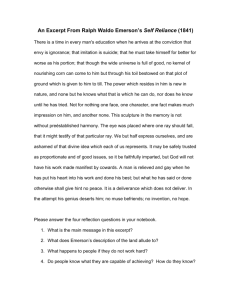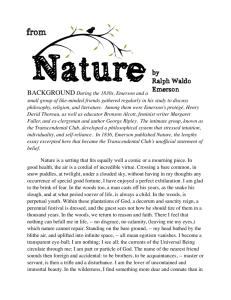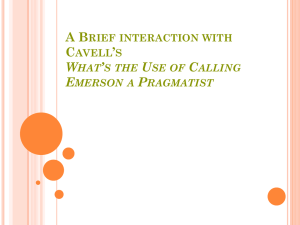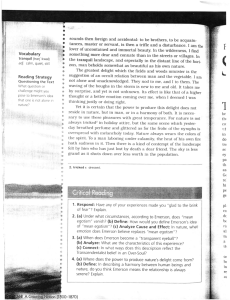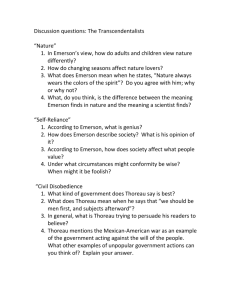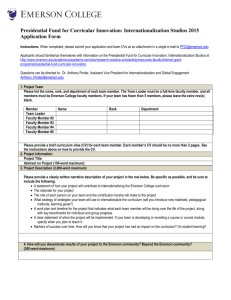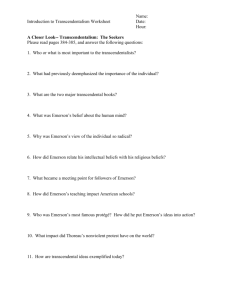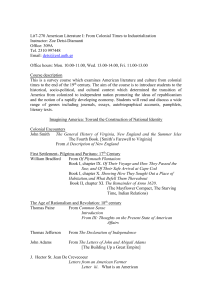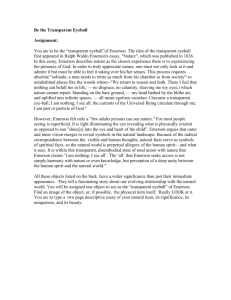Ralph_Waldo_Emerson
advertisement
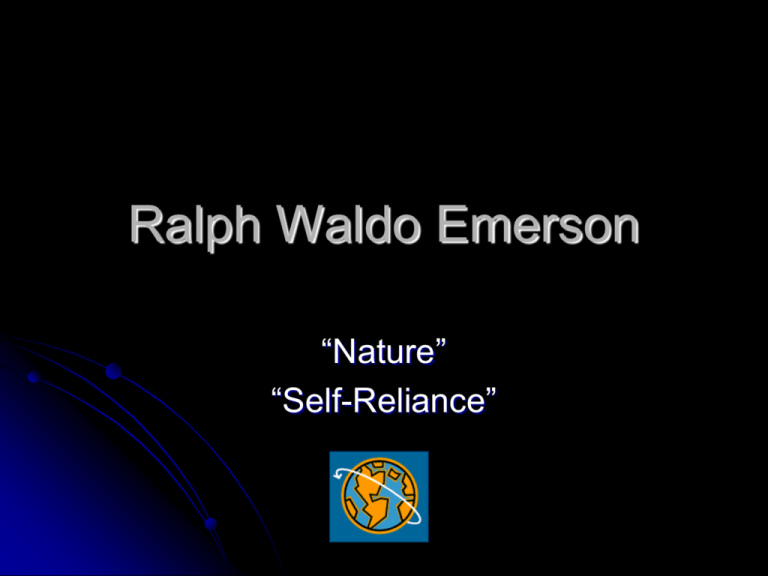
Ralph Waldo Emerson “Nature” “Self-Reliance” Tenets of Transcendentalism Human senses are limited. They convey knowledge of the physical world, but deeper truths can be grasped only through intuition. The observation of nature illuminates the nature of human beings. Tenets of Transcendentalism God, nature, and humanity are united in a shared universal soul, or Over-Soul. About the Selection In this excerpt, Emerson expresses his belief that the meaning of existence can be found while exploring the natural world. He describes how, through his exploration of nature, he has discovered that he is spiritually connected with the universe, with God, and with every living thing. Analysis What does Emerson mean when he talks of a “transparent eyeball”? “I become a transparent eyeball” is a jarring image. Emerson means that he sees everything. The metaphor suggests the poet is like a single, huge eye. Analysis According to Emerson, what is the relationship between Emerson and nature? Emerson feels spiritually a part of nature and every living thing, as well as God. Emerson says that nature allows us to become transparent eyeballs, seeing all, but remaining detached from the business of the world. Critical Reading What emotions does Emerson experience when in the woods? He experiences complete and total delight. Challenging the Text According to Emerson, from where does the power to produce “this delight” come from? The power comes from human beings, not nature, or from a combination of both. Analysis “Mean egotism” vanishes in the woods. “Mean egotism” could be defined as petty narcissism. Nature replaces “mean egotism” with divinity and delight. Analysis Emerson becomes a “transparent eyeball” when he sheds “mean egotism” amidst nature. Through this shedding process, he becomes connected to nature and God. Emerson, like everyone and everything, is connected to the Universal Being. Analysis The power to produce delight comes from a harmony between man and nature. Human beings and nature are forever intertwined, but not necessarily is that relationship serene. Analysis Our experience with nature is never the same way twice. Sometimes nature is less welcoming. It depends, in part, on nature’s mood and, in part, on the emotions we bring to the woods. Nature reflects our emotions and our mood. Analysis Nature teaches us how we are connected to everyone and everything around us. Rhetorical Devices Speaker – Ralph Waldo Emerson Audience – Humanity Purpose – To inform Position – Only through nature can man truly understand his place in the universe, and only through nature can we experience true delight. Rhetorical Devices Visual imagery Philosophical tone Elevated diction Figurative language Alternating syntax (long and short sentences) “Self-Reliance” Emerson exhorts readers to avoid blindly conforming to the ideas and behavior dictated by society or peers. Instead, he urges people to think and act independently. “Trust thyself” What does the passage beginning “Trust thyself” tell you about Emerson’s belief in the importance of the individual? He believes the individual’s importance is from God and that people must therefore honor it and trust in it. Interpretation What does Emerson believe about being true to oneself? Emerson believes it produces the best work and the most spiritual peace. He believes that unless one is true to oneself, one will never find inspiration. According to Emerson: What is society’s main purpose? To conspire against the individual Emerson thinks that people should not care how others perceive them. According to Emerson: What do Pythagoras, Socrates, Jesus, Luther, Copernicus, Galileo, and Newton have in common? They were all misunderstood. Emerson points out that some of the greatest people who ever lived were misunderstood. Figurative Language “Trust thyself: every heart vibrates to that iron string.” “A foolish consistency is the hobgoblin of little minds.” “Speak what you think now in hard words and tomorrow speak what tomorrow thinks in hard words again.” According to Emerson: What role does the “divine” have in determining each person’s circumstances? The divine is God’s idea of what each of us might be if we had the courage to live up to our full potential The reason we live is to seek out God’s purpose for us and to pursue it without fear of society’s pressures and opinions. Rhetorical Devices Speaker – Ralph Waldo Emerson Audience – People who fear nonconformity Purpose – to persuade Position – People should think for themselves and not be concerned that their thoughts may be different from others in society. Rhetorical Devices Visual Imagery Auditory Imagery Figurative language Elevated diction Aphorisms Rhetorical Questions Alternating syntax (long with semicolons; short, concise)

